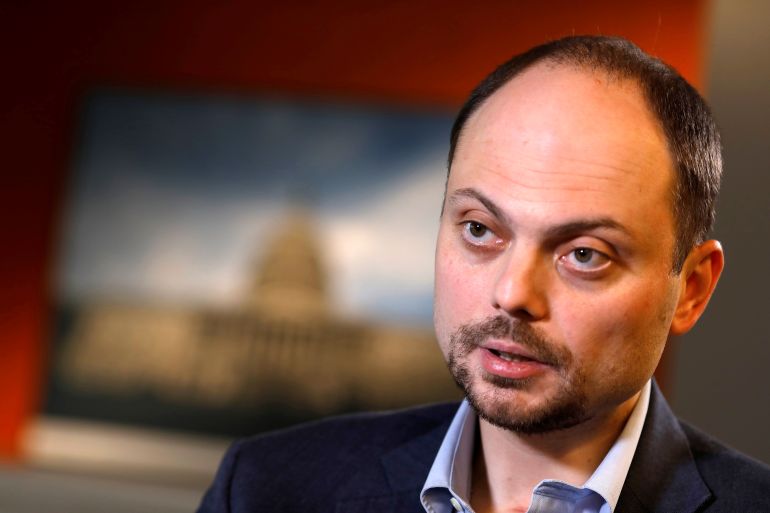Putin critic Vladimir Kara-Murza sentenced to 25 years in prison
Kara-Murza, who has denounced Russia’s war in Ukraine, jailed for treason and denigrating the army.

A Russian court on Monday sentenced Kremlin critic Vladimir Kara-Murza to 25 years in prison for treason and denigrating the military, the harshest sentence of its kind since Russia invaded Ukraine.
The charges against Kara-Murza stem from a March 15 speech he made to the Arizona House of Representatives in the United States, in which he denounced Russia’s war in Ukraine.
Investigators added the treason charges while he was in custody.
Russia adopted a law criminalising spreading “false information” about its military shortly after it sent troops into Ukraine on February 24, 2022.
Authorities have regularly used the wartime law to stifle criticism of what the Kremlin calls “a special military operation”.
Kara-Murza, 41, a father of three and an opposition politician who holds Russian and British passports, spent years speaking out against President Vladimir Putin and lobbied Western governments to impose sanctions on Russia and individual Russians for purported human rights violations.
The British government on Monday summoned the Russian ambassador to make clear its condemnation of what it described as the “politically motivated” conviction and sentencing.
Fierce Kremlin critic
In a CNN interview broadcast hours before he was arrested, Kara-Murza had alleged that Russia was being run by a “regime of murderers.”
He had also used speeches in the United States and across Europe to accuse Moscow of bombing civilian targets in Ukraine, a charge it has rejected.
In his final speech to the court last week, Kara-Murza had compared his own trial, which was held behind closed doors, to Josef Stalin’s show trials in the 1930s and had declined to ask the court to acquit him, saying he stood by and was proud of everything he had said.
“Criminals are supposed to repent of what they have done. I, on the other hand, am in prison for my political views. I also know that the day will come when the darkness over our country will dissipate,” he had said.
“Discrediting” the army can currently be punished by up to five years in prison, while spreading deliberately false information about it can attract a 15-year jail sentence.
At a time of what they have cast as an existential struggle with the West, pro-government politicians say unity across society is vital and have described Russian citizens questioning Moscow’s actions in Ukraine as part of a pro-Western fifth column trying to undermine the military campaign.
Twice, in 2015 and 2017, Kara-Murza fell suddenly ill in what he said were poisonings by the Russian security services, on both occasions falling into a coma before eventually recovering.
Russian authorities denied involvement in the incidents. Kara-Murza’s lawyers say that as a result, he suffers from a serious nerve disorder called polyneuropathy.